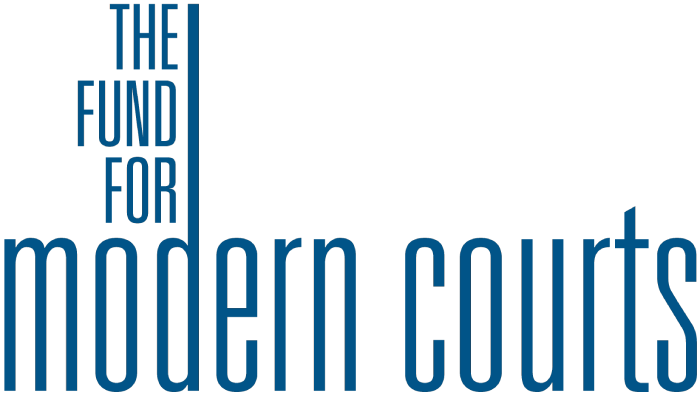New York Law Journal, December 12, 2002
ALBANY – While a federal judge ponders the constitutionality of New York’s century-old rules of judicial conduct, a panel in Albany yesterday discussed the workings of the Commission on Judicial Conduct.
The New York State Bar Association and the Fund for Modern Courts yesterday co-sponsored a forum to educate the public on what the commission does and how it does it.
State Bar President Lorraine Power Tharp of Whiteman Osterman & Hanna in Albany moderated a panel discussion that included Robert H. Tembeckjian, deputy administrator and deputy counsel to the commission; Deputy Chief Administrative Judge Juanita Bing Newton, a former member of the commission; commission member Stephen R. Coffey of O’Connell and Aronowitz; and retired Presiding Justice John T. Racanelli of the California Court of Appeal, former chairman of the California Commission on Judicial Performance. If a consensus emerged, it is that the New York agency is overworked and underfunded, but still manages to fulfill its sometimes conflicting goals of providing an effective forum for complaints while shielding judges from unwarranted allegations. Mr. Tembeckjian observed that the Court of Appeals has reviewed approximately 70 determinations of the commission, and only once, in Matter of Greenfield [76 NY2d 293, 1990], reversed a finding of misconduct.
But if Supreme Court Justice Thomas J. Spargo has his way, the how and what of the commission’s work will soon be revolutionized. Justice Spargo, the target of a commission probe into his political activities, is challenging the restrictions on judicial speech as a violation of his constitutional rights.
Last month in Utica, Northern District U.S. Judge David N. Hurd heard oral arguments in a case where Justice Spargo challenges the constitutionality of a system where candidates are required to run for judicial office – and are therefore by definition politicians – and then prohibited from engaging in political speech.
The commission has accused Justice Spargo, who was a practicing elections lawyer at the same time he was a part-time village justice and candidate for a full-time Supreme Court post, of violating the Code of Judicial Conduct. Justice Spargo readily admits to most of the conduct cited by the commission, such as taking part in a “loud and obstructive” demonstration during the Florida presidential electoral recount in November 2000; delivering a speech to a Conservative Party group; buying food and drinks to potential voters; giving out $5 gasoline vouchers to constituents; and hiring as campaign consultants political operatives who were also delegates to the judicial nominating convention. However, he claims he has a right under the federal and state constitutions to partake in such activities.
At the heart of Justice Spargo’s case is the U.S. Supreme Court’s recent decision in Republican Party of Minnesota v. White, 122 S. Ct. 2528 [2002]. In that matter, the Court ruled unconstitutional a provision in the Minnesota code of judicial conduct barring judicial candidates from revealing their views on “disputed legal or political issues.” Judge Hurd reserved decision on whether the commission can continue its pursuit of Justice Spargo.
Without commenting on Justice Spargo’s lawsuit, Judge Newton said she and other jurists would welcome more guidance on what exactly is permissible or impermissible political activity.
“We are concerned obviously with how far is too far,” Judge Newton said. “I look forward … to getting greater clarification.”
Judge Newton also expressed dismay that more disciplined judges do not challenge the determination and thereby provide an additional opportunity for the Court of Appeals to clarify the ethics rules.
Mr. Tembeckjian acknowledged that some of the restrictions are counter-intuitive. For instance, judicial candidates are not supposed to directly solicit funds and are not supposed to know the identity of those who contribute to their campaigns. However, they are entitled to attend their own fund-raisers, where presumably everyone in attendance paid the price of admission.
Mr. Coffey, who has been a member of the commission for seven years, credited the disciplinary system for vastly improving the judiciary over the last three decades. He said that when he first began practicing in the early 1970s – before the commission was created – ex parte communications, ticket-fixing and myriad other improprieties were the norm.
“I am not here to tell you this is a perfect system,” Mr. Coffey said. “I am not here to tell you that every decision we have made was the correct decision. … But you don’t now have the kind of workings inside a judge’s chamber that we saw historically.”
On the other hand, Mr. Coffey stressed that the commission is not the overbearing, guilty-until-proven-innocent agency as some judges have characterized it. He also disputed the notion that the commission rubber-stamps the decisions of its longtime administrator, Gerald Stern.
Three members of the audience questioned the effectiveness of the commission. One was a father’s rights activist who claimed it is virtually impossible to lodge the equivalent of a “class action” complaint against Family Court judges statewide, whom he said routinely violate the rights of men.
Another was Ron Loeber, an Albany-area man whose complaint led to the censure of Supreme Court Justice Joseph C. Teresi for abusing his judicial power. Mr. Loeber maintains a Web site that [www.nyjail4judges.org] advocates enhanced judicial accountability.
The third was activist Elena Sassower, who accused the commission of wholesale corruption and collusion with various other parties, including the Fund for Modern Courts and the State Bar, in the protection of dishonest and unscrupulous judges. Ms. Sassower, who runs an organization in Westchester County called the Center for Judicial Accountability Inc., offered the panelists two large boxes of materials that she said proves the judiciary is corrupt and that the commission has historically fostered corruption.
